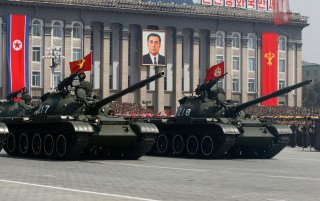Why Kim Jong-un's Death Would Likely Not Change North Korea's Future
Any new leaders would want to prove themselves by staying tough.
Editor's Note: This is part of a symposium asking what happens if Kim Jong-un died. To read the other parts of the series click here.
The recent inaccurate reporting and speculation about Kim Jong-un’s health is a cautionary tale of the unreliability of any claim which purports to reveal the inner workings of the most secretive and reclusive country in the world. The axiom “They who know do not speak, and they who speak do not know” was never truer.
Having said that, the history of the regime and circumstantial evidence provides some indication of what might happen in the event of the sudden death of Kim Jong-un.
First, news of such a death would initially be kept closely guarded and would be released by the regime itself after some delay, as was the case with Kim Jong-un’s predecessors, his father and grandfather. An announcement would only come once the regime’s leaders had decided how to frame the death and the future for the nation and the world.
Second, the initial composition of the new leadership would be discerned in the participation and ranking of the main participants at the funeral. However, this initial configuration and ranking should not be assumed to be permanent. Many of the most prominent senior North Korean officials at the funeral of Kim Jong-un’s father, Kim Jong-il, were sidelined by Kim Jong-un despite his youth and inexperience. Moreover, this was done amidst widespread expectations that they would wield the power behind the throne.
Third, there is no evident line of succession. A likely scenario, at least in the short term, would be the emergence of a collective leadership with one or more members of the Kim dynasty having pride of place. Given the divine-like role that the Kim family plays in North Korea, a Kim presence in a prominent role in the leadership would be essential to ensure the legitimacy of the regime in the eyes of the population.
Fourth, Kim Jong-un’s sister, Kim Yo-jong, is likely to play an important role in the leadership and may sooner or later emerge as the new leader given that she is a member of the Kim family, a trusted adviser to her brother and a rising star in the ruling party. However, her rise is not preordained as she may face resistance from the patriarchy of older men—senior party officials and generals in the leadership who may be reluctant to accept a young woman as leader. These men may even refuse to accept Kim Yo-jong even as a figurehead.
Fifth, senior regime officials may find another Kim more palatable, for example Kim Jong-un’s uncle, career diplomat Kim Pyong-il, the 65 year old half-brother of former leader Kim Jong-il and son of regime founder Kim Il Sung; he returned to Pyongyang in 2019 from a series of diplomatic postings. (Kim Jong-un also has an older half-brother in Pyongyang, Kim Jong-chul, but he has not been involved in politics or government and is unlikely to play a role.)
Sixth, it is possible that a leadership vacuum would lead to a power struggle and instability with a new leadership trying to establish its authority inside North Korea and beyond. Such new leadership may want to demonstrate that it lacks none of the toughness of its predecessors.
Seventh, instability in North Korea would be cause of international concern and would result in a state of high military alert and readiness by the United States, South Korea and China. However, military intervention by outside powers is unlikely except in extreme circumstances of chaos and breakdown of authority in North Korea including, most importantly, control over nuclear weapons.
Eighth, it is most unlikely that a new leadership would deviate from the nuclear path set out to date. Nor are they likely to diverge from the pattern of alternating belligerent and conciliatory behavior that has been a feature of North Korean policy for decades. Other states should not misinterpret cyclical behavior by North Korea as either permanent escalation or easing of tensions.
James Trottier is a Fellow of the Canadian Global Affairs Institute, a lawyer and a former career Canadian diplomat who was accredited to North Korea and led four Canadian diplomatic delegations to North Korea in 2015 and 2016 while directing political/economic (diplomatic) affairs at the Canadian Embassy in South Korea and serving as diplomatic liaison to US/UN Forces in South Korea. He also headed political/economic affairs at the Canadian Embassies in Thailand and the Philippines, was Chargé d’affaires to Myanmar and served at Canada’s Permanent Mission to the UN in New York. He has written and commented extensively on North Korea for print and electronic media and in expert forums.
Image: Reuters.

